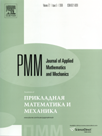 | | Journal of Applied
Mathematics and Mechanics
Russian Academy of Sciences | | Founded
in January 1936
(Translated from 1958)
Issued 6 times a year
ISSN 0021-8928
(print version) |
Archive of Issues
| Total articles in the database: | | 10610 |
| In Russian (ΟΜΜ): | | 9811
|
| In English (J. Appl. Math. Mech.): | | 799 |
|
| << Previous article | Volume 81, Issue 1 / 2017 | Next article >> |
| A.G. Kulikovskii, "Evolution of perturbations on a steady weakly inhomogeneous background. Complex Hamiltonian equations," J. Appl. Math. Mech. 81 (1), 1-10 (2017) |
| Year |
2017 |
Volume |
81 |
Issue |
1 |
Pages |
1-10 |
| DOI |
10.1016/j.jappmathmech.2017.07.001 |
| Title |
Evolution of perturbations on a steady weakly inhomogeneous background. Complex Hamiltonian equations |
| Author(s) |
A.G. Kulikovskii (Steklov Mathematical Institute of the Russian Academy of Sciences, Moscow, Russia, kulik@mi.ras.ru) |
| Abstract |
The evolution of linear unidimensional perturbations on a steady weakly inhomogeneous background, that is, on a background that depends on the coordinate x through the ratio x/L where L is a large scale, is studied. The perturbation evolution time T is considered to be quite large such that the perturbations succeed in propagating over a distance comparable with L, and the inhomogeneity of the background is manifested in the behaviour of the perturbations. Perturbations, generated by a time-limited external action localized in a small domain, are considered in detail. It is assumed that local instability conditions are satisfied in the whole of the domain considered or a part of it, that is, it is assumed that, if the background parameters are "frozen" and assumed to be homogeneous, growing perturbations will exist for states corresponding to a certain domain of values of x/L. A procedure, based on a Fourier transform and the use of the steepest descent method, is formulated for finding the asymptotics of the perturbations at large values of L and T. The perturbations can be described by complex Hamiltonian equations in which the Hamiltonian is a frequency expressed from the dispersion equation as a function of the wave number and coordinate. In the case of instability, these quantities are complex. The relation between the asymptotics obtained and the eigenfunctions of the problem is considered. An example of constructing the asymptotics of the intensification factor is presented; they are identical, within the limits of the assumed accuracy, to the intensification factor found from the exact solution of the problem constructed. The existence of eigenfunctions is pointed out and the corresponding characteristic frequencies are estimated. |
| Received |
28 July 2016 |
| Link to Fulltext |
|
| << Previous article | Volume 81, Issue 1 / 2017 | Next article >> |
|
 If you find a misprint on a webpage, please help us correct it promptly - just highlight and press Ctrl+Enter If you find a misprint on a webpage, please help us correct it promptly - just highlight and press Ctrl+Enter
|
|

 Russian
Russian  English
English